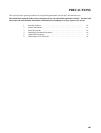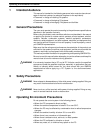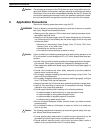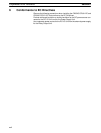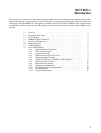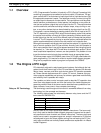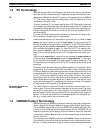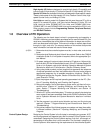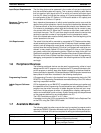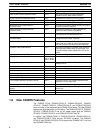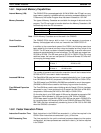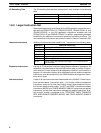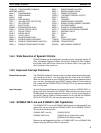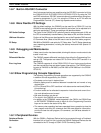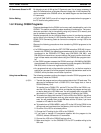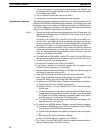
5
Input/Output Requirements The first thing that must be assessed is the number of input and output points
that the controlled system will require. This is done by identifying each device
that is to send an input signal to the PC or which is to receive an output signal
from the PC. Keep in mind that the number of I/O points available depends on
the configuration of the PC. Refer to
3-3 IR Area
for details on I/O capacity and
the allocation of I/O bits to I/O points.
Next, determine the sequence in which control operations are to occur and the
relative timing of the operations. Identify the physical relationships between the
I/O devices as well as the kinds of responses that should occur between them.
For instance, a photoelectric switch might be functionally tied to a motor by way
of a counter within the PC. When the PC receives an input from a start switch, it
could start the motor. The PC could then stop the motor when the counter has
received a specified number of input signals from the photoelectric switch.
Each of the related tasks must be similarly determined, from the beginning of the
control operation to the end.
Unit Requirements The actual Units that will be mounted or connected to PC Racks must be deter-
mined according to the requirements of the I/O devices. Actual hardware specifi-
cations, such as voltage and current levels, as well as functional considerations,
such as those that require Special I/O Units or Link Systems will need to be con-
sidered. In many cases, Special I/O Units, Intelligent I/O Units, or Link Systems
can greatly reduce the programming burden. Details on these Units and Link
Systems are available in appropriate
Operation Manuals
and
System Manuals.
Once the entire Control System has been designed, the task of programming,
debugging, and operation as described in the remaining sections of this manual
can begin.
1-6 Peripheral Devices
The following peripheral devices can be used in programming, either to input/
debug/monitor the PC program or to interface the PC to external devices to out-
put the program or memory area data. Model numbers for all devices listed be-
low are provided in
Appendix A Standard Models
. OMRON product names have
been placed in bold when introduced in the following descriptions.
Programming Console A Programming Console is the simplest form of programming device for OM-
RON PCs. All Programming Consoles are connected directly to the CPU without
requiring a separate interface.
LSS is designed to run on IBM AT/XT compatibles and allows you to perform all
the operations of the Programming Console as well as many additional ones. PC
programs can be written on-screen in ladder-diagram form as well as in mne-
monic form. As the program is written, it is displayed on a display, making confir-
mation and modification quick and easy. Syntax checks may also be performed
on the programs before they are downloaded to the PC.
The LSS is available on either 5” or 3.5” disks.
A computer running the LSS is connected to the C200HS via the Peripheral Port
on the CPU using the CQM1-CIF02 cable.
1-7 Available Manuals
The following table lists other manuals that may be required to program and/or
operate the C200HS.
Operation Manuals
and/or
Operation Guides
are also pro-
vided with individual Units and are required for wiring and other specifications.
Name Cat. No. Contents
GPC Operation Manual W84 Programming procedures for the GPC
(Graphics Programming Console)
FIT Operation Manual W150 Programming procedures for using the FIT
(Factory Intelligent Terminal
Sequence, Timing, and
Relationships
Ladder Support Software:
LSS
Available Manuals Section 1-7



